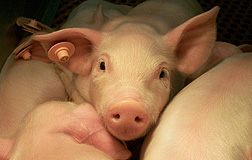 ARS scientists are studying a natural supplement as a possible alternative to antibiotics for promoting pig health and growth.
ARS scientists are studying a natural supplement as a possible alternative to antibiotics for promoting pig health and growth.Alternative Antibiotic Gives Piglets a Boost
January 24, 2018
An amino acid produced naturally in humans, swine and other species shows promise as an alternative to antibiotics and growth promoters for piglets.
Agricultural Research Service (ARS) scientists found that L-glutamine fed to piglets produced positive growth and health effects. This news comes at an opportune time in light of the 2017 Veterinary Feed Directive banning the use of antibiotics in swine diets for promoting growth.
Prior to the ban, producers used certain dietary antibiotics to improve the productivity of animals after stressful events such as weaning and transportation, according to Jay Johnson, an animal scientist at the ARS Livestock Behavior Research Unit in West Lafayette, Indiana. He and his colleagues investigated L-glutamine as a natural remedy to improve intestinal health of piglets undergoing stress and improve welfare and productivity.
Some consumers take L-glutamine, and the synthetic form glutamine, as a supplement to counter side effects of medical treatments, strengthen the immune system, prevent infections and improve digestive health.
In piglets, stress can reduce immune function and leave the animals more susceptible to disease. Supplements that improve digestive health, nutrient absorption, or the intestinal microflora can help remediate these effects and improve the animal's welfare, according to Johnson.
In a study published in the Journal of Animal Science in 2017, Johnson and his team weaned and transported piglets and then fed them a dry-feed diet formulated in one of the following three ways: mixed with dietary antibiotics, mixed with L-glutamine, and mixed with no supplements.
Piglets on the L-glutamine diet had better growth and intestinal health than piglets in the other groups. Piglets on the L-glutamine diet ate 60 percent more food than did those in the other groups. And piglets that received neither dietary antibiotics nor L-glutamine had increased intestinal damage, reduced growth, and increased behaviors associated with illness compared with piglets given antibiotics or L-glutamine.
ARS has filed a patent application for this technology.
For more information contact Sandra Avant, ARS Office of Communications.
The Agricultural Research Service is the U.S. Department of Agriculture's chief scientific in-house research agency. Daily, ARS focuses on solutions to agricultural problems affecting America. Each dollar invested in agricultural research results in $20 of economic impact.
